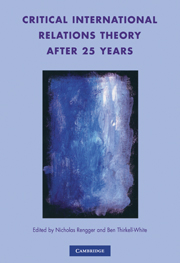Book contents
- Frontmatter
- Contents
- Preface
- Notes on contributors
- Editors' Introduction
- Looking back from somewhere: reflections on what remains ‘critical’ in critical theory
- Transnational theories of order and change: heterodoxy in International Relations scholarship
- Happy Anniversary! Time and critique in International Relations theory
- Is critical theory always for the White West and for Western imperialism? Beyond Westphilian towards a post-racist critical IR
- The promise of critical IR, partially kept
- Towards a sociology of global morals with an ‘emancipatory intent’
- Between Kant and Pufendorf: humanitarian intervention, statist anti-cosmopolitanism and critical international theory
- Index
Preface
Published online by Cambridge University Press: 06 July 2010
- Frontmatter
- Contents
- Preface
- Notes on contributors
- Editors' Introduction
- Looking back from somewhere: reflections on what remains ‘critical’ in critical theory
- Transnational theories of order and change: heterodoxy in International Relations scholarship
- Happy Anniversary! Time and critique in International Relations theory
- Is critical theory always for the White West and for Western imperialism? Beyond Westphilian towards a post-racist critical IR
- The promise of critical IR, partially kept
- Towards a sociology of global morals with an ‘emancipatory intent’
- Between Kant and Pufendorf: humanitarian intervention, statist anti-cosmopolitanism and critical international theory
- Index
Summary
This is the first of four edited books, drawn from Special Issues, which will be produced while the Review of International Studies is based at the University of St Andrews. Editorship of the Review provides a unique opportunity to assemble the leading scholars from particular areas of the field, and all of us involved in the Review at St Andrews are conscious of, and grateful for, the opportunity that presents.
Early on in our term, the editorial team decided that while, of course, we would stand collectively behind all of the Special Issues, we would also allocate the specifics of organising and running them to two designated members of the team who would be responsible, as it were, for ‘their’ Special Issue and the ensuing book. The carrot that went along with that particular stick was that, as a result, the two specific members of the team who had done the work for that Special Issue would ‘edit’ the book version of the Special Issue. Thus, in this case, Nick Rengger and Ben Thirkell White took that task on.
A word about the topic chosen for this first issue. While, again, it was a collective decision, Rengger and Thirkell-White proposed it, each for slightly different reasons, but in the joint belief that this was a good moment to look at the evolution, current state and trajectories of ‘Critical Theory’ in International Relations at its broadest.
- Type
- Chapter
- Information
- Critical International Relations Theory after 25 Years , pp. v - viiiPublisher: Cambridge University PressPrint publication year: 2007



